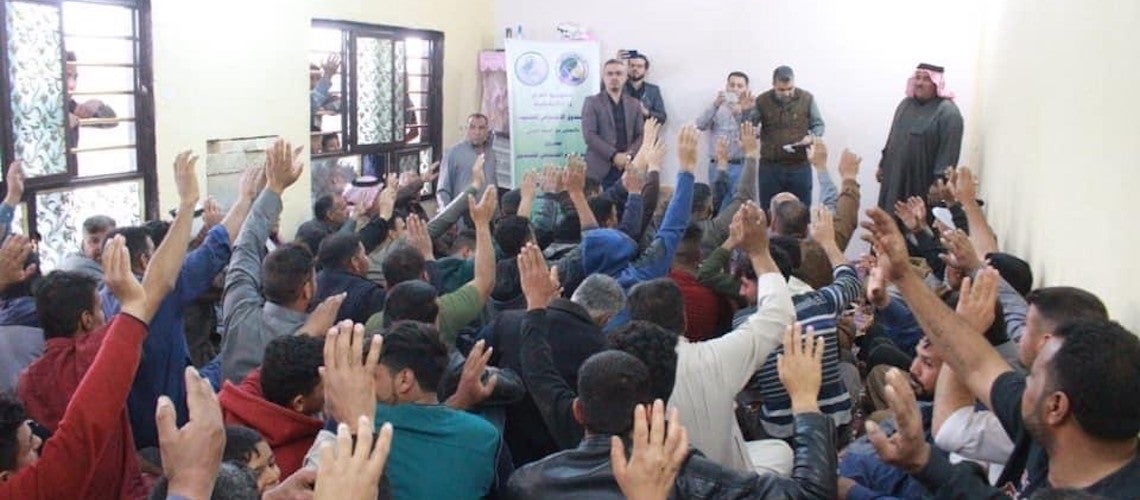 Community members raise their hands at a gathering.
Community members raise their hands at a gathering.
Qutab is a bright, 10-year-old boy who lives in Al-Owainat village about 28km from Tikrit, the capital of Salah Al-Din, one of Iraq's 18 governorates. Qutab was perhaps too young to remember when the Islamic State took control of Tikrit — the hometown of Saddam Hussein — as well as his own village in June 2014. He is certainly not too young now, though, to experience the repercussions of the occupation which left his home area — and that of many other Iraqis — destroyed. The destruction included that of roads critical to the mobility and economic and social integration of Iraqis, especially those living in remote, northern areas.
And Qutab faces yet another challenge common to post-war countries: He is disabled, and is one of the only disabled people in his village to own a wheelchair. With the roads destroyed, however, he couldn’t use it even to get around his village and thus was largely excluded from his own society.
However, thanks to a sub-project that financed the paving of a 2km-long road in Al-Owainat village, identified by the local community as one of its top priorities, Qutab is now able to move around his village independently using his wheelchair. He can finally do many of the things by himself that we often take for granted: going to school, to the local market, and to visit his relatives.
This sub-project is one of 61 ongoing as part of the US$300 million Social Fund for Development (SFD), launched by the Government of Iraq in 2019 and supported by the World Bank. To date, and despite the coronavirus lockdown, these 61 projects, worth about US$10.5 million, are benefitting over 100,000 Iraqis through improved water, education, health, electricity and roads in Muthanna, Salah Al-Din, and Duhok governorates. The SFD works to improve lives by providing better access to basic services and increase short-term employment for Iraqis throughout the country. Notably, the SFD empowers local communities by supporting them to identify their priorities and develop concrete solutions to their most pressing development needs.
The Social Fund for Development is now more important than ever: As a result of the twin crises of COVID-19 and the fall of oil prices, poverty in Iraq is expected to increase by 14.4% to reach an alarming 34.4%. This translates into an additional 5.5 million Iraqis, adding to the 6.9 million already living in poverty. Another 42% of Iraqis are suffering from deprivation in more than one dimension — education, health, living conditions, or financial security — which makes them particularly vulnerable to shocks.
As the SFD empowers communities to identify their own sub-projects, it contributes to the relevance and governance of service delivery that is critical to increasing trust between a government and its citizens through public accountability.
To ensure the sustainability of service provision, the SFD is also supporting the legal establishment of an independent and autonomous SFD institution. This legislation is currently being discussed by the Council of Representatives and is expected to be adopted by the Iraqi parliament later this year.
And the SFD is expanding: Additional sub-projects are expected to be launched over the next few months not only in Muthanna, Salah Al-Din, and Duhok but in the governorates of Qadisiya, Missan, Theqar, and Diyala. The hope is that these additional sub-projects will continue to make a difference in the lives of many Iraqis like Qutab who want to fulfill their dreams and their potential, and who want to contribute to the development of their own communities. The SFD is changing lives, even in these difficult times, through a process owned by local communities everywhere in Iraq.






Join the Conversation